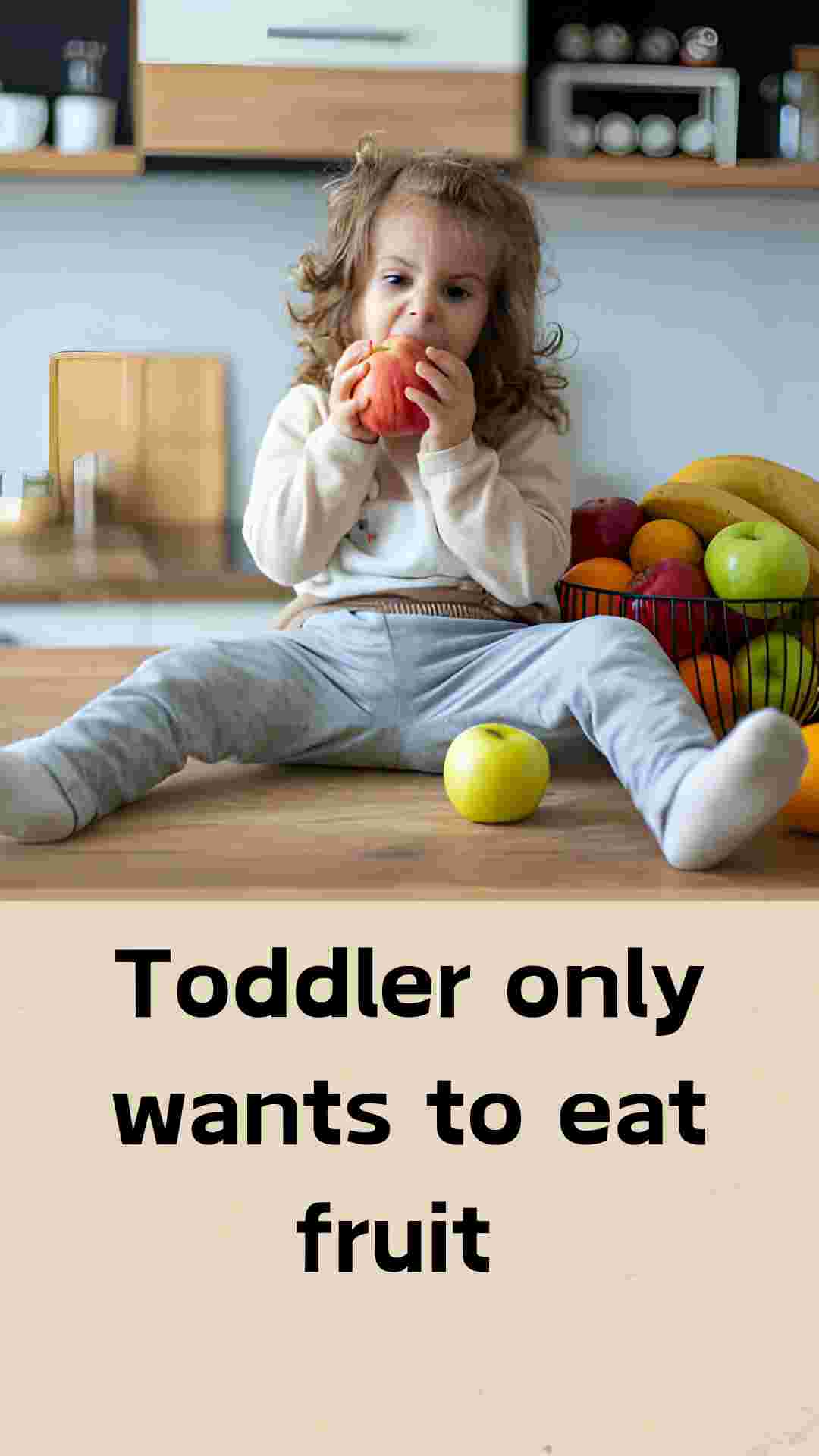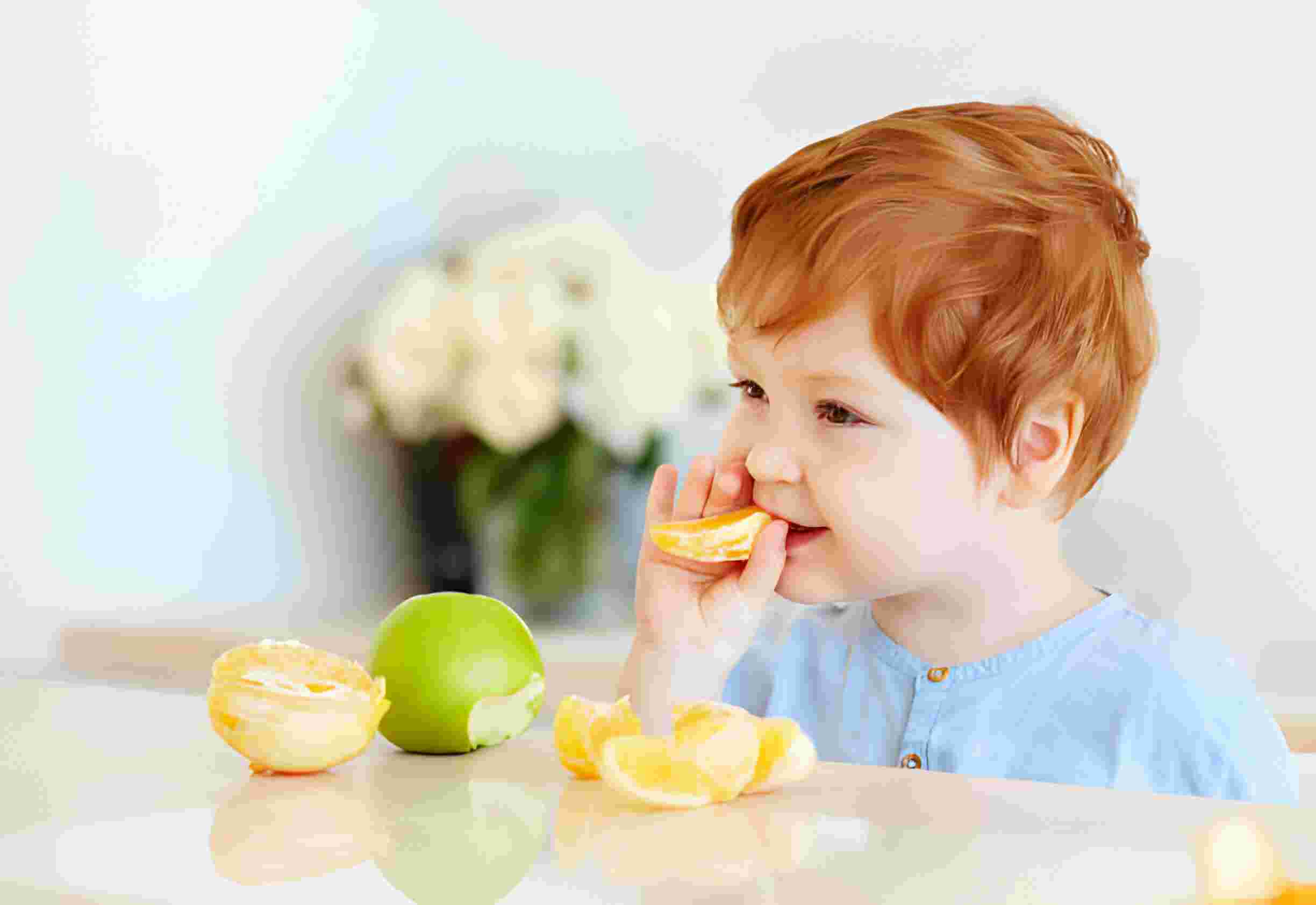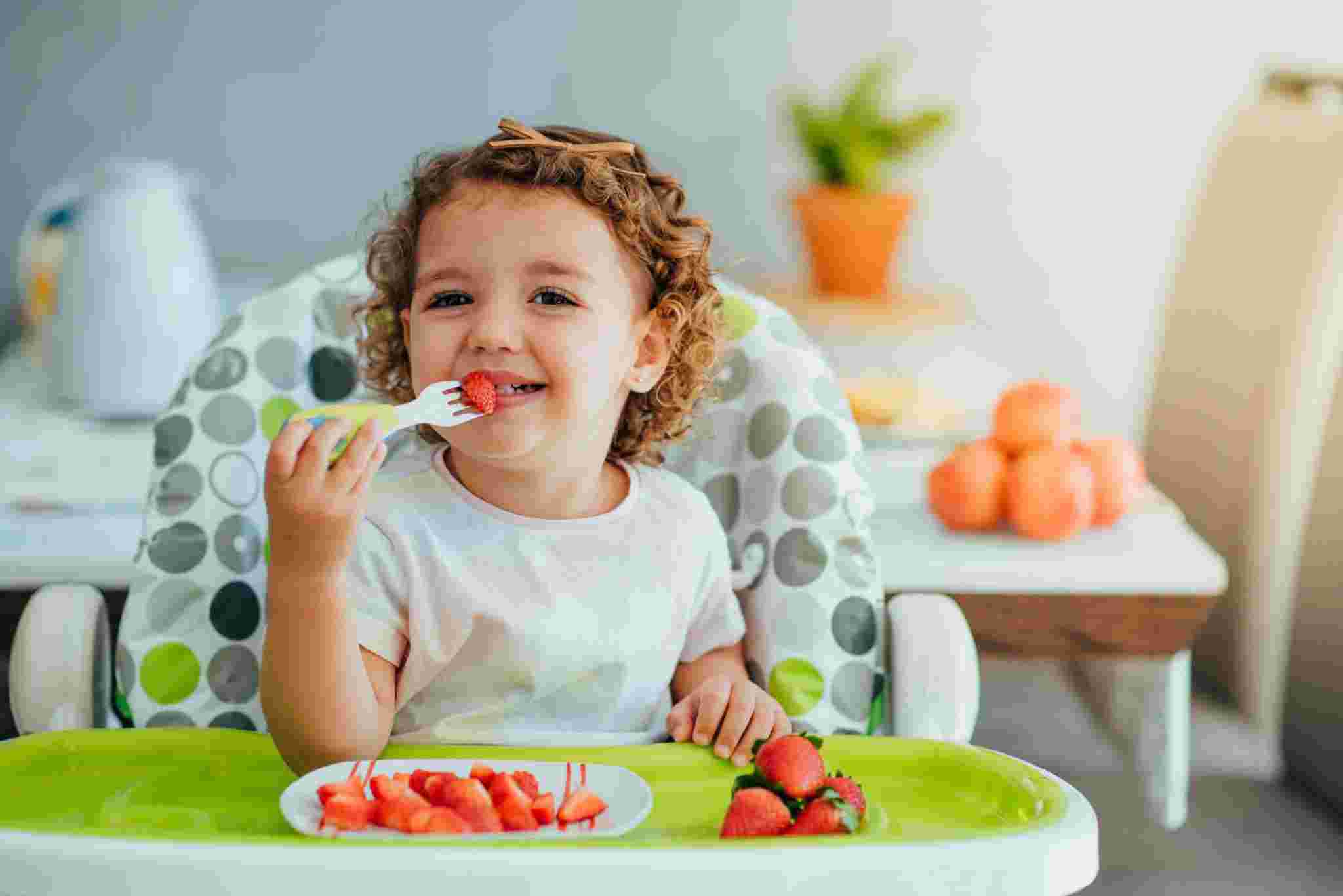In the delightful journey of parenthood, every stage brings unique challenges and heartwarming moments.
One of such juncture is when toddlers, those tiny bundles of curiosity and energy, begin to assert their preferences with a fervor that can both amuse and perplex parents.
One common sight at the family table is when a toddler only wants to eat fruit, turning mealtime into a colorful and sometimes amusing affair.
This phenomenon, while often temporary, raises intriguing questions about a child’s evolving palate, nutritional needs, and the delicate art of fostering a balanced diet while navigating the whims of picky eating.
In this article, we embark on a journey to understand why some toddlers seem to be exclusively devoted to fruit, exploring the underlying reasons, potential nutritional implications, and offers practical tips for parents to navigate through this fruity journey while ensuring their toddler receives a well-balanced diet.
Toddler only wants to eat fruit
It’s quite common for toddlers to have strong preferences for certain foods, like fruits. Fruits can be appealing due to their sweetness and vibrant colors. While it’s great that your toddler enjoys fruits, it’s important to ensure a balanced diet. You might want to:
1. Offer Variety:
Introduce a variety of fruits to ensure a range of nutrients. Include different colors and textures to keep it interesting.
Don’t miss:
- How do I get my child to stop eating junk food? Explained
- My toddler is destroying my house (What to do)
2. Combine with Other Foods:
Pair fruits with other foods, such as yogurt, whole-grain crackers, or cheese, to provide a more balanced meal.
3. Set a Schedule:
Offer fruits at specific meal and snack times, rather than allowing unlimited access throughout the day.
4. Model Eating Habits:
Children often imitate their parents’ eating behaviors. If they see you eating a variety of foods, they may be more likely to do so as well.
5. Patience and Persistence:
Don’t be discouraged if your toddler doesn’t immediately take to other foods. It can take multiple exposures for a child to develop a taste for new foods.
6. Involve Them in Preparation:
Let your child help wash, peel, or cut fruits. This involvement might make them more interested in trying other foods too.
7. Avoid Pressure:
Forcing a child to eat something they don’t want can create negative associations with that food. Keep mealtimes positive.
8. Consult a Pediatrician:
If you’re concerned about your child’s nutrition, consult with a pediatrician. They can provide personalized guidance based on your child’s growth and development.
Why Does My Baby Only Wants To Eat Fruit?
Babies show a preference for sweet and fruity flavors, as they are naturally drawn to them. However, it’s important to ensure a balanced diet.
If your baby is only interested in fruit, you can try offering a variety of healthy foods in different textures, colors, and flavors to encourage a more diverse diet.
Gradually introducing vegetables, proteins, and grains can help create a balanced eating habit
1. Natural Preference:
Babies are born with a natural preference for sweet flavors. This is believed to be an evolutionary advantage since breast milk, their primary source of nutrition, is naturally sweet. Fruits also provide essential nutrients and energy, making them attractive to babies.
2. Texture and Taste:
Fruits have a pleasing texture and are easier to chew and swallow compared to some other foods. The natural sugars in fruits provide an instant source of energy, which may be appealing to babies.
3. Visual Appeal:
The vibrant colors of fruits can catch a baby’s attention. Their bright hues can stimulate curiosity and interest in trying new foods.
4. Developmental Stage:
Babies go through different developmental stages in terms of taste preferences. Initially, they might prefer single-ingredient foods like fruits due to their simple taste profiles. As they grow, their taste preferences may expand.
5. Avoiding Bitterness:
Babies are often more sensitive to bitter tastes, which can be present in vegetables and other foods. This sensitivity could lead them to prefer sweeter options like fruits.
6. Exploration:
Babies are naturally curious and tend to explore the world around them through their senses, including taste. Fruits offer a variety of flavors for them to discover.
7. Social Influence:
Babies are observant and can pick up on the eating habits of those around them. If they see others enjoying fruits, it may encourage them to do the same.
What happens if a toddler eats too much fruit?
If a toddler eats too much fruit, it can lead to several issues:
1. Diarrhea:
Excessive fruit consumption, especially high-fiber fruits like apples and pears, can lead to loose stools or diarrhea due to the high fiber content and natural sugars.
2. Digestive Discomfort:
Excess fruit consumption, especially high-fiber fruits like apples, pears, and berries, can cause bloating, gas and digestive discomfort in toddlers, as their developing digestive systems might struggle to process large quantities of fiber and natural sugars.
3. Nutrient Imbalance:
While fruits are rich in vitamins and minerals, an excessive intake of fruits might lead to an imbalance in nutrients. Too much fruit could result in an inadequate intake of other essential nutrients, such as proteins and fats, which are important for a toddler’s growth and development.
4. Tooth Decay:
Fruits contain natural sugars that can contribute to tooth decay if consumed excessively especially in a sticky or dried form, without proper oral hygiene. The sugar can feed harmful bacteria in the mouth, leading to cavities.
5. Weight Gain:
Overconsumption of fruit can contribute to excessive calorie intake and potential weight gain, as even natural sugars can add up if consumed in large amounts.
6. Allergic Reactions:
Some toddlers may have allergies to certain fruits, and consuming too much of these fruits could increase the risk of an allergic reaction like rashes, hives, or gastrointestinal discomfort.
7. Reduced Appetite for Other Foods:
If a toddler fills up on too much fruit, they might have a decreased appetite for other important foods, leading to an imbalanced diet.
8. Gastrointestinal Upset:
Overeating fruits, especially those high in natural sugars like fructose, can overwhelm a toddler’s digestive system, leading to bloating, gas, and stomach cramps.
9. Blood Sugar Spikes:
High-sugar fruits can cause rapid spikes in blood sugar levels. Although this is usually less of a concern with whole fruits due to their fiber content, excessive consumption could still impact blood sugar regulation.
10. Inadequate Nutrient Diversity:
If a toddler fills up on just one type of food (in this case, fruits), they might miss out on the variety of nutrients offered by a balanced diet, potentially affecting their overall growth and development.
It’s important to note that moderation is key. Toddlers have specific nutritional needs, and a variety of foods should be included in their diet to ensure they receive all the necessary nutrients.
Can I give my toddler fruit everyday?
Yes, it’s recommended to include fruits in your toddler’s daily diet as they provide essential vitamins, mineralls, and fiber.
However, there are a few important points to consider:
1. Variety:
Offer a variety of fruits to ensure a well-rounded nutrient intake. Different fruits provide different nutrients, so it’s good to rotate options. Opt for different colors and types of fruits like berries, bananas, apples, oranges, grapes, and more.
2. Portion Size:
Pay attention to portion sizes. A toddler’s stomach is small, so small servings of fruit are sufficient. Generally, a toddler’s portion of fruit is about 1/4 to 1/2 cup, depending on the age and appetite of your child. A small bowl or a few slices are usually enough.
3. Nutrient Balance:
While fruits are nutritious, it’s important to maintain a balanced diet. Include other food groups like vegetables, whole grains, protein sources, and dairy (if applicable) for a well-rounded diet.
4. Allergies:
Some fruits can trigger allergies in sensitive individuals. Common allergenic fruits include strawberries, citrus fruits, and kiwi. Watch for any adverse reactions.
5. Natural Sugars:
Fruits contain natural sugars, but they also provide important nutrients. Limiting added sugars from other sources is more crucial than limiting natural sugars in fruits.
6. Dental Health:
Some fruits are acidic and may affect dental health. Encourage your toddler to rinse their mouth with water after eating fruits and practice good oral hygiene.
7. Age-Appropriate:
Choose fruits that are easy to eat and pose minimal choking hazards. Cut fruits into small, manageable pieces to reduce the risk.
8. Fresh, Frozen, or Canned:
Fresh fruits are ideal, but frozen fruits without added sugars can be a convenient alternative. If using canned fruits, choose those packed in water or natural juice, not syrup.
9. Hydration:
Fruits also contribute to hydration due to their high water content, but make sure your toddler is drinking an appropriate amount of water throughout the day.
10. Nutritional Benefits:
Fruits provide essential nutrients like vitamin C, potassium, folate, and dietary fiber. These nutrients are important for your toddler’s growth, immune system, and overall development.
11. Introducing New Fruits:
Introduce ne fruits gradually and watch for any allergic reactions. Start with one new fruit at a time and wait a few days before introducing another.
12. Preparation:
Wash fruits thoroughly before giving them to your toddler. Peel or remove any seeds if necessary.
13. Snacking:
Fruits make great snacks, but they can also be included in meals like breakfast cereals, yogurt, or whole grain pancakes.
14. Modeling Healthy Eating:
Your toddler is more likely to enjoy fruits if they see you eating them too. Set a good example by including fruits in your own diet.
How do I get my toddler to eat more than just fruit?
Encouraging your toddler to eat a balanced diet beyond just fruits involves a combination of strategies. Here’s a detailed approach:
1. Lead by Example:
Demonstrate healthy eating habits yourself. Children often mimic what they see their parents or caregivers doing.
2. Establish a Routine:
Set regular meal and snack times to create a predictable eating schedule. This helps develop hunger cues and prevents grazing throughout the day.
3. Create a Positive Environment:
Make mealtimes enjoyable and stress-free. Sit down together as a family, use colorful plates, and avoid distractions like TV or devices.
4. Offer Variety:
Introduce a wide range of foods, including vegetables, lean proteins, whole grains, and dairy. Rotate the options to keep meals interesting.
5. Small Portions:
Serve small portions initially. It can be overwhelming for toddlers to have large amounts of unfamiliar foods on their plates.
6. Engage Their Senses:
Let your child touch, smell, and explore different foods before eating. This helps them become more comfortable with new textures and flavors.
7. Get Creative:
Experiment with different cooking methods (steaming, roasting, blending) and presentation styles to make foods visually appealing.
8. Involve Them:
Let your toddler help with simple tasks in the kitchen, like stirring, washing vegetables, or placing toppings. This can pique their interest in food.
9. Dip and Sauce Fun:
Offer healthy dips or sauces for vegetables or proteins. Sometimes, the act of dipping can make eating more enjoyable.
10. Be Patient:
Toddlers can be picky eaters due to their developing taste preferences. It may take several exposures to a new food before they accept it.
11. Avoid Pressure:
Avoid forcing your child to eat or making mealtime a power struggle. This can create negative associations with food.
12. Combine Foods:
Mix new foods with familiar ones. For example, you can add chopped vegetables to pasta or blend them into a smoothie.
13. Role Model Peers:
If your child has older siblings or peers who eat a variety of foods, they may be more inclined to try them as well.
14. Limit Snacking:
Offer nutritious snacks, but avoid letting your toddler fill up on snacks close to mealtime.
15. Celebrate Successes:
Praise and encourage your child when they try new foods or eat a balanced meal.
In conclusion of toddler only wants to eat fruit, a toddler’s preference for consuming primarily fruits is a common phase that many children go through. While this behavior may raise concerns about a balanced diet, it is essential for parents to maintain patience and provide a variety of nutrient-rich options. Encouraging a diverse range of foods, incorporating vegetables, whole grains, and protein sources, will contribute to a well-rounded and nutritious diet as the child continues to grow and develop.












